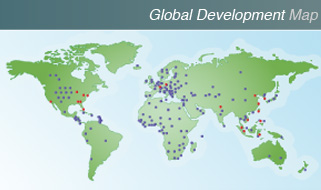-
“We love, we live
We give what we can give
And take what little we deserve”
Posted April 19, 2012
“We love, we live. We give what we can give. And take what little we deserve”
- Christine Daaé, “Love Never Dies"
If spring is the season of Passover and Easter, it is also the season of charitable events. Races and walks, golf tournaments and bike rides. Across the country people turn out to support causes like brain tumor research, breast cancer research, and of course ALS research. In the Washington, D.C. area many of these events have taken on almost a “reunion” personality. One such (truly) amazing Race is the Cassidy/Turley Race for Hope in Washington, D.C. on May 6th.
This will be the 15th running of what started as a small event hosted by Pat Cassidy’s real estate firm which has now blossomed into a 5k where thousands will walk or run and donate money. They have raised over $15 million to date for the National Brain Tumor Society. In the early days of the race they sold T- shirts where participants as teams, or individuals would run in shirts which said either “in memory of” or “in support of” brain tumor victims, or patients. Sometimes you would see entire classes from a school walking together; military units entered and ran in formation and, always, there were families. Many children in strollers; pictures of loved ones, pictures of lost ones… carried on signs or on the T- shirts. In the early days the “support” T-shirts were blue and the “in memory of” were yellow. I’ll never forget the emotional impact of seeing my son’s name on the back of several blue T-shirts ahead of me in the middle of one early walk; literally a patch of blue in a sea of yellow. It was a stark visualization of just how blessed we had been.
I mention this now because wherever you are reading this, I am sure that there are a host of events near you this spring, and I urge you to go out and enjoy yourself and support these wonderful causes. I also mention it because this is also the season where the Congress is debating the FDA user fee reauthorization legislation that will greatly impact the direction and speed of research into all of these terrible diseases. There is a battle being waged by the patient advocacy community to force Congress to try to accelerate this research. A battle to try to change the culture of the FDA and how it looks at experimental drugs; to try to give patients with incurable diseases broader and quicker access to potentially life-saving therapies.
The fate of these proposals is still uncertain. There does seem to be a bipartisan effort to make sure that something gets passed to address the issue of innovation. But my reading of the proposals is that nothing will change if the FDA doesn’t want it to change. The language about supporting innovation and breakthrough technologies is laced with “catch phrases” and conditional words (like “validated”) which could keep the status quo in place. The intent of this language is to be certain that the FDA “standards” are not compromised. This is a worthy goal that no one should dispute. No one is suggesting that the FDA “dumb down” the meaning of “effective.” But that is not the point of the effort. The point of the effort is to find a way to make potential breakthrough drugs available to patients BEFORE we know, by the old definitions, that they are effective. That is what is truly needed. The FDA should make sure that treatments are safe; but then there should be a category of diseases and conditions which qualify for extraordinary measures, and patients should have access. The FDA would point out that collected data from such a group would be “unscientific” and, therefore, unreliable by their standards. That is undoubtedly true. But there are times and places where exceptions need to made. The existing framework for accelerated trials, and validated surrogate markers is insufficient to make the meaningful changes that these patients need. Experience has proven this; the merest patch of blue in a sea of yellow has proven this.
As I mixed with families of brain tumor patients who had not been as fortunate as we had been, I marveled at their emotional strength and determination to make a difference. I see the same things in the faces of the ALS caregiver community. I never had the strength to ask how they did it, how they managed the day-to-day price of their loss. But I think I know. I think the answer would come back much as the poignant words penned by Sir Andrew Lloyd Webber above: “they love, they live, they give what they can give; and they ask nothing in return.” So please go out and support as many of these wonderful people at these wonderful events as you can this spring. And urge your Congressional representatives to support the proposals to change the direction of the FDA. They are not perfect, but they are a necessary start.






